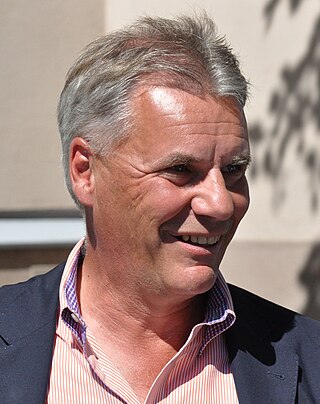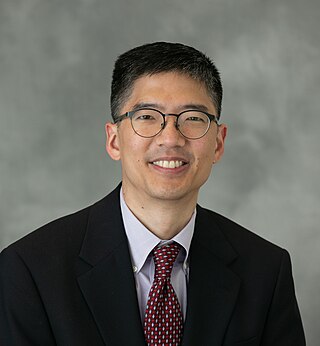
Olli-Pekka Kallasvuo chaired the committee for World Design Capital Helsinki 2012, and is the former chairman, chief executive officer and president of Nokia, as well as a former board member of Nokia Siemens Networks.

Tianwen Tony Cai is a Chinese statistician. He is the Daniel H. Silberberg Professor of Statistics and Vice Dean at the Wharton School of the University of Pennsylvania. He is also professor of Applied Math & Computational Science Graduate Group, and associate scholar at the Department of Biostatistics, Epidemiology & Informatics, Perelman School of Medicine, University of Pennsylvania. In 2008 Tony Cai was awarded the COPSS Presidents' Award.

Gerald D. Fischbach is an American neuroscientist. He received his M.D. from the Weill Cornell Medical College of Cornell University in 1965 before beginning his research career at the National Institutes of Health in 1966, where his research focused on the mechanisms of neuromuscular junctions. After his tenure at the National Institutes of Health, Fischbach was a professor at Harvard University Medical School from 1972 to 1981 and from 1990 to 1998 and the Washington University School of Medicine from 1981 to 1990. In 1998, he was named the director of the National Institute of Neurological Disorders and Stroke before becoming the Vice President and Dean of the Health and Biomedical Sciences, the Dean of the Faculty of Medicine, and the Dean of the Faculty of Health Sciences at Columbia University from 2001 to 2006. Gerald Fischbach currently serves as the scientific director overseeing the Simons Foundation Autism Research Initiative. Throughout Fischbach's career, much of his research has focused on the formation and function of the neuromuscular junction, which stemmed from his innovative use of cell culture to study synaptic mechanisms.
Bruce Rosen is an American physicist and radiologist and a leading expert in the area of functional neuroimaging. His research for the past 30 years has focused on the development and application of physiological and functional nuclear magnetic resonance techniques, as well as new approaches to combine functional magnetic resonance imaging (fMRI) data with information from other modalities such as positron emission tomography (PET), magnetoencephalography (MEG) and noninvasive optical imaging. The techniques his group has developed to measure physiological and metabolic changes associated with brain activation and cerebrovascular insult are used by research centers and hospitals throughout the world.
Marvin Zelen was Professor Emeritus of Biostatistics in the Department of Biostatistics at the Harvard T.H. Chan School of Public Health (HSPH), and Lemuel Shattuck Research Professor of Statistical Science. During the 1980s, Zelen chaired HSPH's Department of Biostatistics. Among colleagues in the field of statistics, he was widely known as a leader who shaped the discipline of biostatistics. He "transformed clinical trial research into a statistically sophisticated branch of medical research."

Curtis Huttenhower is a Professor of Computational Biology and Bioinformatics in the Department of Biostatistics, School of Public Health, Harvard University.

Michelle Ann Williams is a Jamaican-American epidemiologist, public health scientist, and educator who has served as the dean of the Harvard T. H. Chan School of Public Health since 2016.
Constantine Achilleos Gatsonis is a Greek-born biostatistician, currently the Henry Ledyard Goddard University Professor of Biostatistics, Chair of Biostatistics and Founding Director for the Center for Statistical Sciences at the Brown University School of Public Health. He is well known for his work with evaluation of diagnostic and screening tests.

Joel Salinas is an American-born Nicaraguan neurologist, writer, and researcher, who is currently an Assistant Professor of Neurology at Harvard Medical School. He practices general neurology, with subspecialty in behavioral neurology and neuropsychiatry, at the Massachusetts General Hospital in Boston, Massachusetts. He is also a clinician-scientist at the Harvard T.H. Chan School of Public Health and the Framingham Study at the Boston University School of Medicine.
Digital phenotyping is a multidisciplinary field of science, first defined in a May 2016 paper in JMIR Mental Health authored by John Torous, Mathew V Kiang, Jeanette Lorme, and Jukka-Pekka Onnela as the "moment-by-moment quantification of the individual-level human phenotype in situ using data from personal digital devices." The data can be divided into two subgroups, called active data and passive data, where the former refers to data that requires active input from the users to be generated, whereas passive data, such as sensor data and phone usage patterns, are collected without requiring any active participation from the user.

Rafael Irizarry is a professor of biostatistics at the Harvard T.H. Chan School of Public Health and professor of biostatistics and computational biology at the Dana–Farber Cancer Institute. Irizarry is known as one of the founders of the Bioconductor project.
Tianxi Cai is a Chinese biostatistician. She is the John Rock Professor of Population and Translational Data Sciences in the Department of Biostatistics at the Harvard T.H. Chan School of Public Health. Topics in her research include biomarkers, personalized medicine, survival analysis, and health informatics.
Susan S. Ellenberg is an American statistician specializing in the design of clinical trials and in the safety of medical products. She is a professor of biostatistics, medical ethics and health policy in the Perelman School of Medicine at the University of Pennsylvania. She was the 1993 president of the Society for Clinical Trials and the 1999 President of the Eastern North American Region of the International Biometric Society.

Tyler J. VanderWeele is the John L. Loeb and Frances Lehman Loeb Professor of Epidemiology in the Departments of Epidemiology and Biostatistics at the Harvard T.H. Chan School of Public Health. He is also the co-director of Harvard University's Initiative on Health, Religion and Spirituality, the director of their Human Flourishing Program, and a faculty affiliate of the Harvard Institute for Quantitative Social Science. He holds degrees from the University of Oxford, University of Pennsylvania, and Harvard University in mathematics, philosophy, theology, finance, and biostatistics.
Kaumudi Jinraj Joshipura is an Indian American Epidemiologist, Biostatistician, Dentist & Scientist. She is Adjunct Full Professor at Harvard T.H. Chan School of Public Health (HSPH) at Harvard University and NIH Endowed Chair and Director of the Center for Clinical Research and Health Promotion and a Full Professor at the University of Puerto Rico, Medical Sciences Campus. Her research work has been covered by global media including CNN, ABC, NBC, NHS, Newsweek, Nature, Telegraph, Japanese Journals and Japanese TV etc.
Alain-Jacques Valleron (born 24 August 1943 in Neuilly-sur-Seine is Professor Emeritus at the Pierre-et-Marie-Curie University and a member of the French Academy of sciences, of which he was Delegate for Scientific Information and Communication. He is the founder of the "Sentinel Network".

The Brown University School of Public Health is the public health school of Brown University, a private research university in Rhode Island. It is located along the Providence River, down the hill and about a quarter mile from Brown's central campus on College Hill. The School of Public Health grew out of the Department of Community Health at Brown's Alpert Medical School and was officially founded in 2013 as an independent school.
Ophir David Klein is an American developmental biologist who specializes in pediatric medical genetics. Klein is Executive Director of Cedars-Sinai Guerin Children’s, Vice Dean for Children’s Services, Professor of Pediatrics, and the David and Meredith Kaplan Distinguished Chair in Children’s Health. He is also a professor of Orofacial Sciences and Pediatrics at UCSF.

Michael S. Lauer is an American cardiologist and physician-scientist. He is the deputy director for extramural research at the National Institutes of Health (NIH).

Michael F. Chiang is an American pediatric ophthalmologist serving as the director of the National Eye Institute. His research focuses on the interface of biomedical informatics and clinical ophthalmology in areas such as retinopathy of prematurity (ROP), telehealth, artificial intelligence, electronic health records, data science, and genotype-phenotype correlation.











